A detox diet refers to a diet plan aimed at removing toxins from the body, typically lasting for a short period of time, such as a few days to a few weeks, with restricted food intake and specific food choices. Detox diets can vary in types and methods, including fasting, juice diets, specific food choices, and the use of supplements or herbs to promote detoxification.
The benefits of detox diets for toxin elimination and weight management are not well-supported by clinical evidence. Limited studies with flawed methodologies and small sample sizes hinder the validity of research in this area. While some studies suggest certain foods may have detoxification properties, mainly in animals, no randomized controlled trials have been conducted on the effectiveness of commercial detox diets in humans.
What is a Detox Diet?
Detox diets are dietary meal plans that claim to improve health by facilitating the elimination of toxins from the body, often also aiming for weight loss. These diets have gained significant popularity, although scientific evidence supporting their efficacy is limited.
Some clinical studies suggest that certain detox diets may enhance liver detoxification and help remove persistent organic pollutants, but these findings are often criticized for flawed methodologies and small sample sizes.
Despite the absence of robust, randomized controlled trials in humans, certain foods like coriander, nori, and olestra are believed to have detoxification properties, mainly based on animal studies.
What is a 7-day Detox Diet?
A 7-day Detox Diet is a short-term dietary regimen that often involves a significant reduction in caloric intake and focuses on nutrient-dense foods. It aims to cleanse the digestive system quickly, usually within a week. The primary purpose is to offer a “reset” for the body, especially after periods of excessive indulgence. It provides quick results but is not sustainable for long-term health goals.
How does the Detox Diet work?
The detox diet works by implementing various methods such as fasting, drinking juices, specific diets, supplements, herbs, colon cleansing, reducing environmental exposures, and sauna use to supposedly remove toxins from the body, aid in weight loss, and improve overall health.
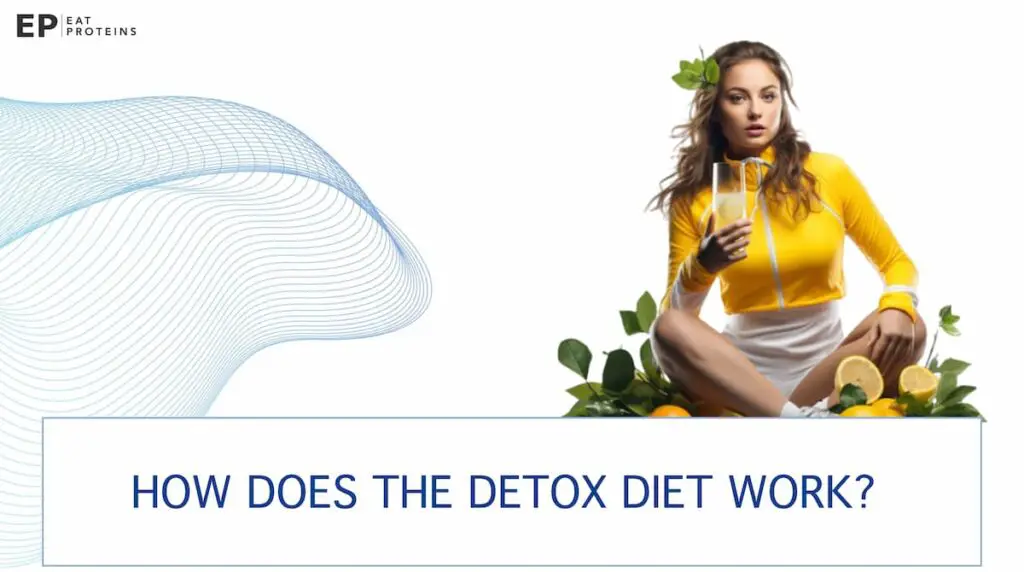
In a 2019 study conducted by Laura Davisson at West Virginia University Health Sciences Center, an assessment of a 21-day detox diet revealed noteworthy improvements in cravings for sweet/salty foods, energy levels, and sleep quality when comparing the pre-diet and one-week post-diet surveys. However, these findings come with caveats such as small sample sizes and lack of randomized controlled trials to substantiate the claims.
There is limited research on the efficacy of detox programs, with low-quality studies showing mixed results. Additionally, the FDA and FTC have taken action against companies selling detox products with illegal ingredients or false claims. It is important to consult healthcare providers and be cautious of potential risks associated with detox diets.
How does a Detox Diet contribute to weight loss?
A detox diet often leads to initial weight loss due to its caloric restriction, creating a calorie deficit that results in shedding pounds. However, this weight loss is generally short-lived; resuming a regular diet frequently leads to weight regain, effectively reversing the initial loss.
Given its temporary nature, the detox diet raises questions about its long-term efficacy and sustainability for maintaining weight loss. Therefore, it is crucial to approach detox diets with caution and consider more sustainable weight management options.
What are the benefits of the Detox Diet?
The detox diet has several benefits, including toxic trace element detoxification and body fat reduction, according to a 2020 study by Su-Jin Jung from Chonbuk National University Hospital.
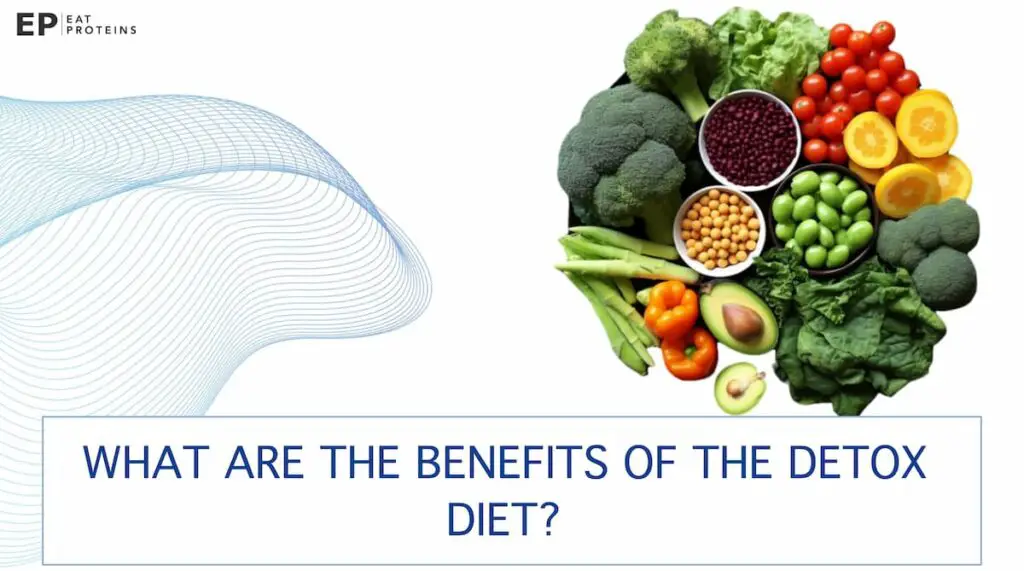
- Toxic Trace Element Detoxification: The detox diet has been shown in clinical trials to significantly reduce levels of specific toxic trace elements like Nickel (Ni), Rhodium (Rh), Tin (Sn), and Gallium (Ga) in participants’ hair samples.
- Body Fat Reduction: Detox diets, such as the Wellnessup diet, have been shown to improve body composition, including reductions in BMI, waist circumference, and hip circumference.
- Weight Management: Alongside body fat reduction, the detox diet can aid in overall weight management, particularly when compared to a regular diet.
- Improved Energy Levels: Some people report feeling more energetic during and after detox diets, although this benefit is often anecdotal and may vary from person to person.
- Digestive System Reset: Detox diets often involve a simplified menu, which can give the digestive system a break from processing complex foods and may improve digestion.
- Craving Control: A structured detox diet can sometimes help individuals identify and control cravings for unhealthy foods, thereby aiding longer-term dietary habits.
While detox diets are often touted for various health benefits, it’s essential to exercise caution and seek medical advice, given that the scientific evidence supporting these benefits is limited. Moreover, the effects, particularly regarding weight loss, are generally short-term and may not offer a sustainable solution for long-term health improvements.
What are the health risks of the Detox Diet?
The health risks of detox diets can include potential weight regain after the initial loss, foodborne illnesses from unpasteurized juices, kidney problems from high-oxalate foods, dehydration, and electrolyte imbalances due to laxatives, and nutrient deficiencies from severely restrictive diets.
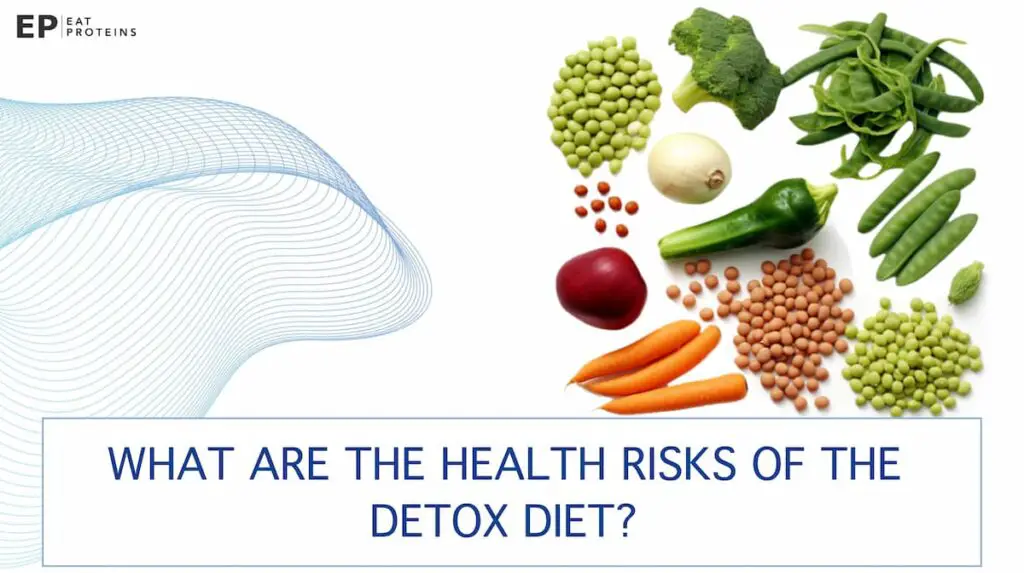
- Potential Weight Gain: Detox diets often result in initial weight loss due to calorie restriction, but this can be followed by weight gain once a normal diet is resumed, making the approach unsustainable for long-term weight management.
- Risk of Illness from Unpasteurized Juices: Consuming unpasteurized juices, commonly included in juice detox diets, exposes individuals to the risk of foodborne illnesses.
- Kidney Problems from High-Oxalate Foods: Detox juices often contain high-oxalate foods, which can increase the risk of kidney problems, including kidney stones.
- Dehydration and Electrolyte Imbalances: The use of laxatives and diuretics, sometimes promoted in detox diets, can lead to dehydration and dangerous imbalances in electrolyte levels.
- Nutrient Deficiency: Severely restrictive detox diets may lack essential nutrients, putting individuals at risk for nutritional deficiencies, which can have a range of negative impacts on health.
How to Start a Detox Diet?
To start a detox diet, first decide on the duration, which can range from 3 to 30 days, and the type of diet, such as a juice cleanse or water fasting. Consult a healthcare provider, especially if you have existing health conditions, and then plan your ingredients, caloric intake, and daily schedule.
- Decide on Duration: Choose how long your detox will last, ranging from a short 3-day cleanse to a more extended 30-day program.
- Select Type of Diet: Decide whether you will be doing a juice cleanse, water fasting, or another type of detox diet.
- Identify Purpose: Determine the primary goal of your detox, whether it’s weight loss, liver detoxification, or other health objectives.
- Consult a Healthcare Provider: Before starting, consult a healthcare provider, particularly if you have existing health conditions that may affect the detox.
- Plan Ingredients: Make a list of fruits, vegetables, herbs, and other ingredients you will use, considering whether you’ll opt for organic or non-organic items.
- Set Caloric Intake: Decide on the number of calories you’ll consume each day, which can vary widely depending on the detox type.
- Exercise Plan: Determine whether to include physical activity in your detox program and what type it will be.
- Consider Supplements: Decide if you’ll use any detox supplements or vitamins and factor this into your budget.
- Prepare for Side Effects: Be aware of potential health risks or symptoms you might experience and have a plan to manage them.
What is the recommended duration for a Detox Diet?
The recommended duration for a detox diet varies depending on individual health goals and needs, ranging from short-term plans like a 3-day Detox Diet to longer-term options like a 30-day Detox Diet. Consulting a healthcare provider is advisable for personalized guidance on the most appropriate duration for you.
- 3-Day Detox Diet: A quick, short-term plan focused on eliminating toxins through natural, nutrient-dense foods and beverages. It reduces processed foods and may result in short-term weight loss.
- 7-Day Detox Diet: An intermediate-length plan that extends the 3-day detox, usually with a focus on specific nutrient intake and potentially incorporating light exercises.
- 10-Day Detox Diet: Similar to the 7-day detox but longer, this diet often includes more complex nutrients and may involve taking supplements. It aims to cleanse the digestive system and may require the elimination of certain food groups.
- 30-Day Detox Diet: A comprehensive, month-long plan aimed at supporting the body’s natural detoxification processes. It emphasizes whole foods, hydration, and the avoidance of processed and harmful substances.
What foods are recommended for a Detox Diet?
A detox diet typically recommends consuming foods that are rich in nutrients and promote detoxification. These foods include organic plant-based meals with vegetables, fruits, whole grains, and nuts.
- Vegetables: (spinach, kale, broccoli, and beets)
- Fruits: (blueberries, apples, grapefruit, and avocado)
- Whole Grains: (quinoa, brown rice, oats, and whole grain pasta)
- Nuts and Seeds: (almonds, walnuts, chia seeds, and flaxseeds)
What foods should be avoided on a Detox Diet?
On a detox diet, certain foods should be avoided to promote toxin removal and weight loss.
- Processed and packaged foods
- Fried foods
- Fatty meats
- Added sugars
- Alcohol
- Caffeine
- Sugary beverages
What does a Detox Diet meal plan consist of?
A detox diet meal plan typically consists of low-calorie and nutrient-rich foods aimed at eliminating toxins from the body. It often involves consuming primarily fruits, vegetables, and lean proteins, while avoiding processed foods, sugar, caffeine, and alcohol. The recommended daily calorie intake during a detox diet can range between 1,000 to 1,500 calories, depending on individual needs and goals.
What does a 7-day Detox Diet meal plan look like?
This table outlines a 7-day detox meal plan.
| Day | Breakfast | Lunch | Dinner |
|---|---|---|---|
| 1 | Green smoothie | Quinoa salad | Grilled chicken and steamed veggies |
| 2 | Oatmeal with berries | Lentil soup | Baked salmon and asparagus |
| 3 | Fruit salad | Veggie stir-fry | Brown rice and black beans |
| 4 | Chia seed pudding | Chicken Caesar salad | Veggie curry |
| 5 | Avocado toast | Tomato soup | Beef stir-fry |
| 6 | Scrambled eggs | Sushi roll | Zucchini noodles with pesto |
| 7 | Pancakes (gluten-free) | Tuna salad | Stuffed bell peppers |
What are some easy Detox Diet plans for beginners?
Easy detox diet plans for beginners often focus on incorporating whole, natural foods while eliminating processed and sugary items; they may include a 3-day fruit and vegetable cleanse or a 7-day plan that incorporates lean proteins, fruits, and vegetables.
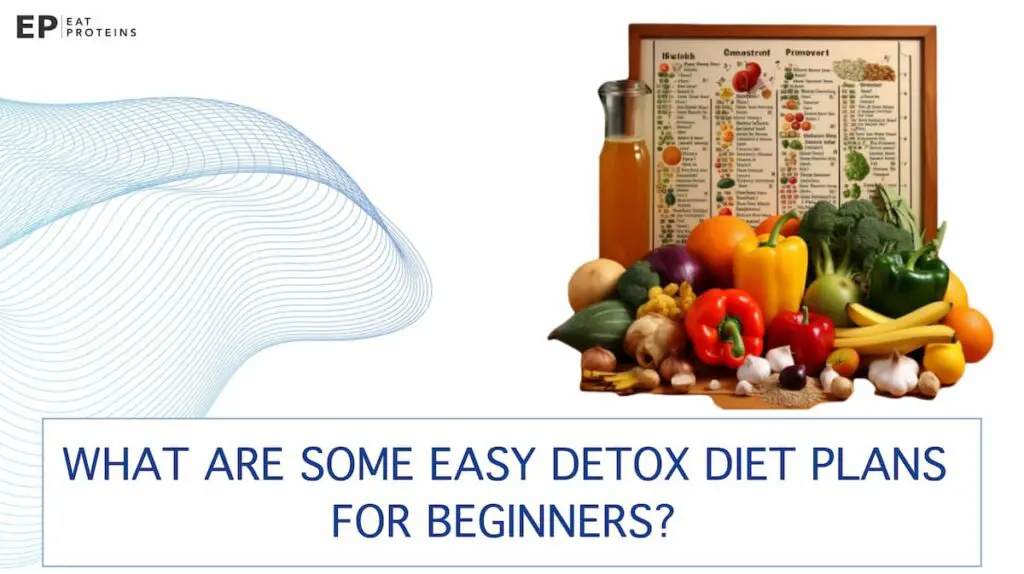
Juice cleanses, which involve consuming only fruit and vegetable juices for a short period, like 3 days, are also commonly recommended for beginners. However, it’s crucial to consult a healthcare provider before starting any detox diet, especially given the potential health risks such as nutrient deficiencies and electrolyte imbalances.
What can you expect from a Detox Diet lasting 3 days?
A detox diet lasting 3 days typically involves restricted calorie intake and specific food choices aimed at eliminating toxins from the body. During this period, individuals can expect to experience initial weight loss of approximately 2-4 pounds due to reduced calorie consumption.
However, once the detox diet is completed and normal eating habits are resumed, weight gain may occur, potentially negating the initial weight loss. It is important to note that the long-term effects of a 3-day detox diet have not been studied extensively.
What are the types of Detox Diets?
Detox diets come in various forms, such as juice or liquid detoxes, food-based detoxes, fasting detoxes, and supplement-based detoxes. Each type aims to achieve detoxification and may include additional goals like weight loss or liver cleansing. The following list outlines the 23 most common types of detox diets.
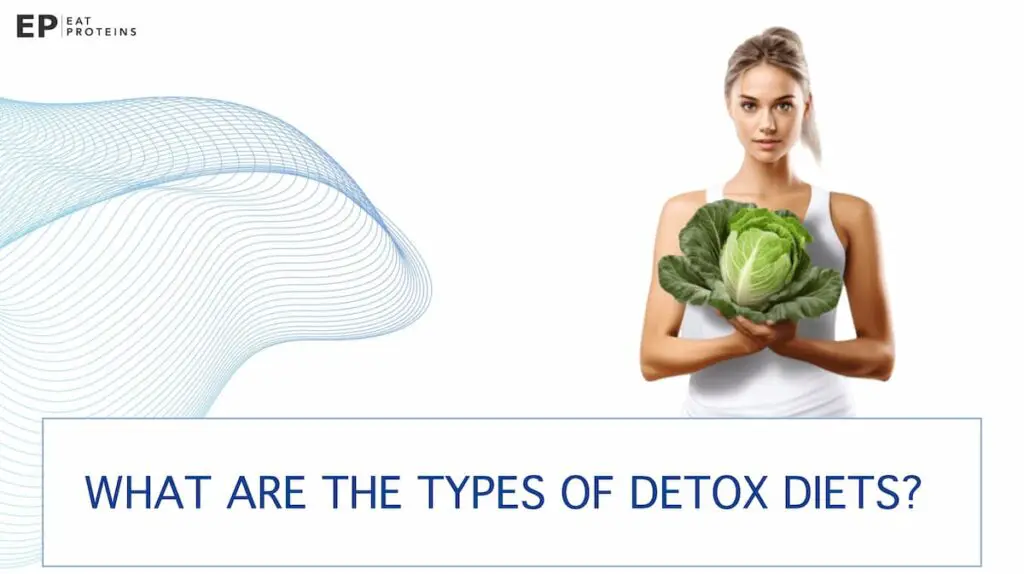
- Sugar Detox Diet
- Liver Detox Diet
- Quit Smoking Detox Diet
- Mold Detox Diet
- Weight Loss Detox Diet
- Fibromyalgia Detox Diet
- Tea Detox Diet
- Cellular Detox Diet
- Lemon Detox Diet
- Cellulite Detox Diet
- Soup Detox Diet
- Alcohol Detox Diet
- Smoothie Detox Diet
- Juice Detox Diet
- Liquid Diet Detox
- Gut Detox Diet
- Candida Detox Diet
- Estrogen Detox Diet
- Vegan Detox Diet
- Heavy Metals Detox Diet
- Water Detox Diet
- Inflammation Detox Diet
- Raw Foods Detox Diet
1. Sugar Detox Diet
The sugar detox diet aims to eliminate added sugars and high-glycemic foods from the diet to regulate blood sugar levels and reduce cravings. The objective is to reset the body’s sugar balance and improve metabolic health.
This diet may benefit those dealing with sugar cravings or metabolic syndrome, preferably under medical guidance. The goal is metabolic regulation and improved insulin sensitivity, although a challenge is the initial withdrawal symptoms from sugar.
2. Liver Detox Diet
The Liver Detox Diet focuses on foods that support liver function, such as cruciferous vegetables, fruits, and healthy fats. The aim is to assist the liver in its detoxification processes. Those concerned about liver health, perhaps due to a history of alcohol or drug use, should consider this diet but consult a healthcare provider.
3. Quit Smoking Detox Diet
The quit-smoking detox diet is designed to help you eliminate nicotine and other smoking-related toxins from the body. It emphasizes foods high in antioxidants and vitamins like A and C. Those attempting to quit smoking may benefit from a quit-smoking detox diet, ideally in conjunction with other quitting methods.
4. Mold Detox Diet
A mold detox diet is a specific eating plan designed to eliminate mycotoxins, toxic compounds released by mold, from your body. This diet focuses on removing foods that are likely to contain mycotoxins and incorporating nutrient-dense, anti-inflammatory foods that support detoxification.
5. Weight Loss Detox Diet
The weight loss detox diet is a short-term dietary plan, typically lasting 10-21 days, with the goal of promoting weight loss by eliminating processed foods, sugars, and other potential toxins from the diet. It often involves consuming a variety of whole, nutrient-rich foods and beverages to support the body’s natural detoxification processes.
Although it is intended as a jumpstart to a healthier lifestyle, it is not a sustainable long-term solution for weight management. Weight loss may largely consist of water weight, and rapid weight loss can be difficult to maintain.
6. Fibromyalgia Detox Diet
The Fibromyalgia Detox Diet, or simply, the fibromyalgia diet, is a dietary meal plan designed to eliminate foods that may trigger inflammation and exacerbate the symptoms of fibromyalgia, such as processed foods and sugar. By focusing on anti-inflammatory foods like omega-3 fatty acids and antioxidants, this diet aims to alleviate pain and improve energy levels in individuals suffering from fibromyalgia.
7. Tea Detox Diet
The tea detox diet involves the consumption of various herbal teas, such as green tea, fennel tea, or peppermint tea, that claim to cleanse the body of toxins and aid in weight loss. These teas often contain ingredients like flavonoids, catechins, and polyphenols that may improve metabolism and assist in detoxification processes.
Generally healthy adults looking for a mild detoxification regimen might consider this diet, although medical consultation is advised. While the tea detox diet is simple and easy to follow, there is a lack of scientific evidence for long-term benefits.
8. Cellular Detox Diet
The cellular detox diet is aimed at cleansing cells from accumulated waste products through the consumption of foods rich in antioxidants, vitamins, and minerals. It focuses on cellular autophagy, a process that breaks down and recycles cellular components, thereby enhancing cellular function.
Individuals interested in cellular health and anti-aging may consider this diet, although it should be done under medical supervision. The purpose is to improve cellular health; the pros include the potential for increased energy and longevity, while the cons include a lack of comprehensive scientific backing.
9. Lemon Detox Diet
The lemon detox diet involves consuming lemon juice, water, and maple syrup mixture to purportedly cleanse the system. This diet aims to promote detoxification through diuresis and may lead to short-term weight loss. While those looking for a quick detox may opt for this, the lemon detox diet is not recommended for prolonged periods or without medical consultation because the cons include nutritional deficiencies and potential harm if done improperly.
10. Cellulite Detox Diet
The cellulite detox diet is focused on eliminating foods that promote water retention and fat accumulation, such as processed foods, in order to reduce the appearance of cellulite (Gynoid lipodystrophy). It emphasizes high-fiber and antioxidant-rich foods to improve skin elasticity and reduce inflammation, however, there is limited scientific evidence to support its effectiveness.
11. Soup Detox Diet
The soup detox diet, similar to the cabbage soup diet, involves consuming various vegetable-based soups to encourage detoxification and weight loss. The high fiber and water content in soups may facilitate digestive health and promote satiety. However, its downsides could include its repetitive nature, its unsuitability for the long term, and the potential for nutrient deficiencies.
12. Alcohol Detox Diet
The alcohol detox diet is a nutrient-dense plan designed to aid the liver in processing and eliminating alcohol, aimed at individuals recovering from alcohol use disorder (AUD) under medical supervision. The diet’s primary purpose is to assist in managing withdrawal symptoms and support liver health during alcohol detoxification. While it offers targeted nutritional support for liver function, the diet requires medical oversight and may have complications if not properly managed.
13. Smoothie Detox Diet
The smoothie detox diet involves consuming blended fruits, vegetables, and protein sources to cleanse the body and promote weight loss. The high fiber and nutrient content aim to improve digestion and boost metabolism. Generally healthy individuals looking for a convenient way to increase nutrient intake may opt for this diet. The purpose is nutrient intake and potential weight loss; the pros include convenience and taste, while the cons may involve sugar content and potential lack of satiety.
14. Juice Detox Diet
The juice detox diet involves consuming fruit and vegetable juices to cleanse the body’s systems. These juices are rich in vitamins and minerals but lack fiber, which is removed during the juicing process. Those looking for a short-term detox may consider this diet, but it is not recommended for long periods.
15. Liquid Diet Detox
The liquid diet detox consists of consuming liquids like soups, smoothies, and teas to cleanse the digestive system. It aims to provide temporary relief from digestive discomfort and promote weight loss. Generally, healthy adults may consider this for a brief period. The objective is to cleanse the digestive system; an advantage is the ease of digestion, but a limitation is the potential lack of essential nutrients.
16. Gut Detox Diet
The gut detox diet, also known as the Gut reset diet, focuses on foods that promote a healthy gut microbiome, such as fermented foods (kefir, yogurt, cheese, etc.), and foods high in fiber while eliminating inflammatory foods.
It aims to improve digestion and nutrient absorption. Individuals with digestive issues may benefit from this diet under medical guidance. The goal is to enhance gut health; a positive aspect is a potential improvement in digestive function, but a drawback is the initial adjustment period which may include digestive discomfort.
17. Candida Detox Diet
The Candida Detox Diet, also known as the Candida Diet, is a low-sugar, anti-inflammatory diet designed to combat the overgrowth of Candida yeast in the body by avoiding foods that feed yeast and bacteria. It focuses on low-sugar, high-fiber foods and may include antifungal supplements.
Individuals suspected of having Candida overgrowth should pursue this diet with the guidance of a medical professional. The ultimate objective is to diminish Candida overgrowth, with an advantage being the precise targeting of a specific medical concern, though a disadvantage lies in the diet’s restrictive nature.
18. Estrogen Detox Diet
The estrogen detox diet, also known as estrogen detoxification, is specifically crafted to enhance the body’s metabolism and remove surplus estrogen. Symptoms of excessive estrogen exposure encompass heavy menstruation, irritability, mood swings, headaches, and sleep disturbances. This dietary approach incorporates fiber-rich foods like cruciferous vegetables and whole grains. Women grappling with hormonal imbalances should contemplate this diet, preferably under the supervision of a healthcare provider.
19. Vegan Detox Diet
The vegan detox diet, often referred to as vegan detox or plant-based diet detox, involves adopting a plant-based diet entirely free of animal products. Its primary objective is to purify the body while adhering to vegan principles. Individuals who are either already vegans or those interested in exploring veganism may find this diet appealing. Its purpose encompasses both ethical and physical detoxification, with the advantage of ethical alignment with animal welfare. However, a potential drawback is the risk of nutrient deficiencies if not carefully planned.
20. Heavy Metals Detox Diet
The Heavy Metals Detox Diet, or simply heavy metal detox, is designed to remove foods and substances that contribute to the accumulation of heavy metals in the body. Heavy metal toxicity can adversely impact organ function, energy levels, and blood composition. Prolonged exposure to heavy metals can result in degenerative conditions like cardiovascular disease, Alzheimer’s disease, and autism. Nonetheless, the effectiveness and safety of heavy metal detoxification methods remain subjects of ongoing debate.
21. Water Detox Diet
The water detox diet, commonly known as water fasting, revolves around the consumption of substantial amounts of water to eliminate toxins from the body. Typically, it is a short-term regimen designed for swift detoxification. Generally, healthy adults may contemplate adopting this approach for a brief duration. The primary objective is to achieve rapid detoxification, highlighting the diet’s advantage in terms of simplicity and ease of adherence. However, it’s essential to exercise caution as an excessive pursuit of this diet could lead to the potential risk of water intoxication.
22. Inflammation Detox Diet
The inflammation detox diet, also known as an anti-inflammatory diet, is a nutritional regimen designed to combat systemic inflammation by emphasizing the consumption of anti-inflammatory foods like berries, nuts, and green tea. This diet is particularly targeted at individuals suffering from conditions exacerbated by inflammation, such as arthritis and heart disease, and is best followed under medical guidance.
The primary objective of this diet is to alleviate symptoms and improve quality of life by reducing bodily inflammation. While the diet offers the advantage of potential symptom relief and improvement in inflammatory conditions, it is not a substitute for medical treatments and should be viewed as a complementary approach.
23. Raw Foods Detox Diet
The Raw Foods Detox Diet, also known as a raw food cleanse, is a specialized dietary approach that involves consuming foods in their uncooked and unprocessed forms, such as fruits, vegetables, and nuts.
The primary aim of this diet is to facilitate natural detoxification, while potentially enhancing digestive health and boosting energy levels. This regimen may particularly appeal to those interested in a holistic, naturalistic approach to nutrition. While the diet offers the benefit of preserving the natural nutrients in foods due to the absence of cooking, it also poses a risk of foodborne illnesses, making it essential to exercise caution and consider medical guidance.
What are the scientific facts about the Detox Diet?
Based on existing scientific literature, detox diets show mixed results in terms of their efficacy and safety. Some studies suggest that detox diets may help with cravings, energy levels, and sleep quality, but these findings are often based on self-reported data and lack robust methodology. Moreover, detox diets are often calorie-restricted, which may lead to nutrient deficiencies and various health problems, casting doubts on their long-term effectiveness and safety.
How does a Detox Diet differ for women?
A detox diet may differ for women based on hormonal fluctuations, nutritional needs, and specific health concerns like reproductive health or bone density. Some detox plans for women may focus on foods that are rich in iron and calcium, or that aim to balance hormones naturally.
How do Detox Diets differ from traditional diets?
Detox diets differ from traditional diets like the DASH, ketogenic, or Mayo Clinic diet in that they primarily focus on eliminating toxins and “cleansing” the body rather than long-term lifestyle changes for weight loss or disease management.
Traditional diets often have a broader range of food options and are designed for sustainability, backed by scientific evidence for specific health benefits such as lowering blood pressure or managing diabetes. In contrast, detox diets are often short-term, highly restrictive, and may incorporate specialized products like Herbalife detox or Yes You Can detox, which are not commonly found in traditional diet plans.
What is included in the “Yes You Can” diet plan detox?
The Yes You Can diet plan detox includes the 7-day Detox Plus Kit and the 7-day Detox. The Detox Plus Kit supports optimal liver and kidney function, cleanses the liver and body of toxins, improves digestion, and purifies the blood.
It includes Yes You Can diet pills where you take 1 pill in the morning and 2 pills at night. Additionally, you stay hydrated by adding the Aloe Vera Drink Mix to your water throughout the day and replacing one meal per day. According to their website, the Yes You Can detox has shown results of losing 5lbs in 2 days.
Can you really lose 5 lbs in 2 days with a Detox Diet?
Yes, it’s possible to lose 5 lbs in 2 days on a detox diet, but such rapid weight loss is generally not considered safe or sustainable. The weight lost is often water weight and is likely to be regained once a normal diet is resumed, making this approach not recommended for long-term weight management.
Where can you find a 7-Day Detox diet plan in PDF format?
The 7-day detox diet plans in PDF format can commonly be found on health and wellness websites, through registered dietitian blogs, or via medical institutions that offer nutritional guides. Make sure to verify the credibility of the source and consult a healthcare provider before starting any detox plan.
